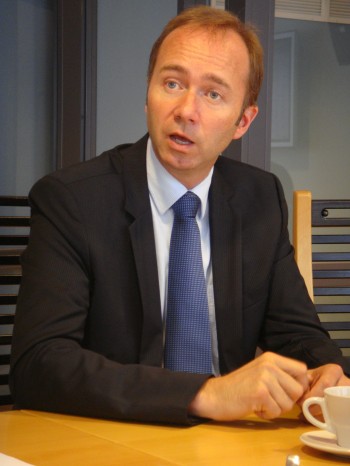Norway’s Business and Trade Minister Trond Giske, known as “Turbo Trond” because of his frequent travels, has been jetting all over the world of late to make new contacts and open new doors for Norwegian companies. But oil and gas, he says, will continue to fuel the country for the foreseeable future.

“Norway will live off the oil and gas industry for several more decades,” he told members of the Foreign Press Association in Oslo on Wednesday. Even though Norway’s oil reserves may only last another 20 years, he said, gas should be around for much longer. And there’s “continuous development” of marginal fields, he said, along with offshore technology, development, construction and maintenance expertise to share and export.
Giske, who keeps a high profile in the Norwegian media, recently assembled a group of young Norwegian business owners, many of them wealthy heirs to some of the country’s biggest companies, to help figure out what will sustain Norway’s economy in future generations. He got in trouble at the outset by including Crown Prince Haakon in the group, because the royal heir is supposed to stay out of politics, but Giske moved on and indicated his group also believes most in oil and gas. “There are other ideas as well,” he said, but said Norway’s economic future will “grow out of our present industries.” Technology and construction of wind power projects, for example, would represent “a natural development” for Norwegian industry.

“The accident in the gulf will change the industry forever,” he predicted. There will be more emphasis on safety and new technology, and as the Norwegian market “matures,” Norwegian companies will keep looking for new opportunities overseas and export the offshore knowledge accumulated over the past 40 years, especially in the area of subsea installations, Giske said. He also sees a promising future for undersea mining and tapping the “biodiversity” of the seas and “strong development” of conventional mining in northern Norway.
Ambitious
The tall, 43-year-old career politician from the left side of the Labour Party took over as business and trade minister just last fall, after serving as Minister of Culture for the previous four years in Norway’s Labour-dominated center-left government coalition. He has said he intends to hang on to his post for the next four years, to provide some needed continuity in a ministry that’s had a string of different political bosses.
There’s no question, though, that Giske is ambitious and some think he’s gearing up to take over as Labour’s leader when Prime Minister Jens Stoltenberg has had enough. If so, he’ll likely be a rival of Foreign Minister Jonas Gahr Støre from the more conservative side of the Labour Party. Støre and Giske disagree on several political issues, not least on whether Norway should join the European Union (EU). Støre favours membership, while Giske attracted more headlines last week for not only repeating his opposition but suggesting that Norwegian politicians should let the EU debate lie dormant. Giske called Norway’s current “relationship” to the EU “perfect” and “a good compromise” by being involved through the European Economic Association agreement but not being part of the EU or its monetary union itself.
“Our present platform is a very good one,” he repeated on Wednesday. And he denied that Norway simply “skims the cream” off its EU relationship, as the head of the Conservative Party has suggested. “We contribute a lot, too, with billions paid into the EU,” he said. “That proves our solidarity.”
State ownership under scrutiny
Giske, summing up his term so far, is also working on a new government study of its ownership interests in Norwegian companies. The state currently holds major stakes in such firms as Norway’s biggest bank DnB NOR, Statoil, Norsk Hydro, Aker Holding, Telenor and Yara International. It also owns other firms like Statkraft (where Giske installed former DnB NOR boss Svein Aaser as its new chairman on Wednesday), Entra Eiendom and Mesta.
“We need to ask ourselves why we (the state) are owning, what we’re owning and how we’re organizing our ownership,” Giske said. “We haven’t come very far, but we may discuss shifting ownership among ministries, but probably keeping our same level of ownership.”
The state, he noted, is a “dedicated long-term owner, strong on capital and not so concerned with short-term quarterly profits.” There were few signs of becoming a more active owner, though. “We need to be professional and predictable,” Giske said. “If we have opinions on things, we need to influence other board members, just like every other owner.”
Views and News from Norway/Nina Berglund
Join our Forum if you’d like to comment on this story.

